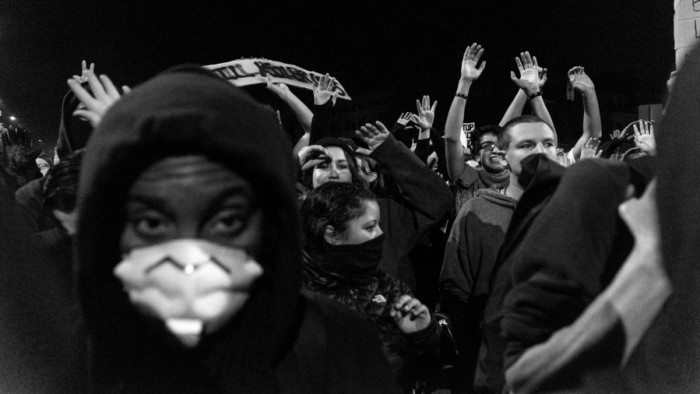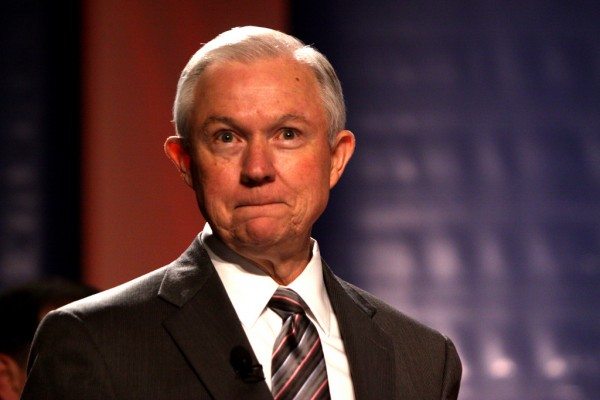

#BlackLivesMatter protest in Berkeley, California in 2014 (Annette Bernhardt/Flickr)
The excitement around Donald Trump’s presidential campaign exposes the political bankruptcy and limitations of the United States’ political landscape. On the one hand thousands of Latinos, Mexicans, immigrants and women are rightfully offended and appalled by his racist comments; on the other, thousands of mostly poor, middle-class white people feel as though someone is finally around to represent their best interests.
Trump’s strategic scapegoating of immigrants and Mexicans redirects the growing energy focused against Wall Street billionaires, like himself, and divides working people against each other and purposefully misinforms large parts of the population.
It is clear that Donald Trump is the new face of white supremacy. His rhetoric, specifically the fear mongering and misinformation about “illegal Mexicans” and the dangers they pose to society, has been equated to statements heard at KKK rallies. One of his “consultants” on immigration policy is an Alabama senator who has been linked to white supremacist groups and is an advocate of anti-immigrant policies directed at Mexicans and Latinos.


Jeff Sessions, the Republican senator from Alabama (Gage Skidmore/Flickr)
Many would agree that it is necessary to confront Trump’s racist, anti-immigrant, anti-latino, anti-Mexican and mysoginistic rhetoric not only because it is hateful and hurtful, but also because these statements reproduce a false narrative about people of color and, as we have seen, translates into physical violence directed at Latinos and immigrants. It also works to ignore the systemic racism embedded in U.S. institutions and policy.
However, in the context of one of the most significant social movements that emerged in the past year, #BlackLivesMatter, it is insufficient to simply be anti-Trump. The #BlackLivesMatter movement shifted the public discourse around race and has been key to making visible the systemic levels of state violence that have intensified in the recent years.
After the Ferguson rebellion, it is impossible to talk about race or discrimination in the United States without acknowledging the way economic policy has reinforced systemic racism and how the criminal justice system has disproportionately been targeted against blacks. Racism is not only a manifestation of individual hate or prejudice towards another due to the color of their skin. It is systemic discrimination and exclusion when it comes to the acquisition of wealth, employment, housing, education, among other critical factors.
The focus exclusively on Trump not only blurs the current realities of systemic racism and the state violence faced by people of color and immigrants, it also actively undermines and redirects the power of grassroots mobilizations towards the presidential campaign and electoral politics.
While certain policy advances have clearly been made recently when it comes to supporting the Latin@ and immigrant communities, the political establishment overall has not been too kind when it comes to issues in regards to Mexicans, Latinos and immigrants.


Hillary Clinton, the former secretary of state (Marc Nozell/Flickr)
It has been recently reported that private prison lobbyists have raised tens of thousands of dollars for Hillary Clinton’s campaign, highly questioning her ability or willingness to release women, children and transgender immigrants currently detained and facing rampant physical and sexual abuse. Additionally, Clinton has supported the deportation of children fleeing violence from Central America, many of whom qualify for humanitarian relief.
The Obama administration has spent $2.5 billion dollars on the Mérida Initiative, a program designed to “fight organized crime” but that has been linked to the perpetuation of human right abuses in Mexico, as well as the deportation of over two million people, more than any other U.S. president.
The list goes on.
Despite the fact that these issues may worsen under a Trump presidency, we must not forget that many of the issues he rants about have existed, and in many cases worsened, under both Democratic and Republican administrations.
A cornerstone of the #BlackLivesMatter movement was that their initial focus dug deeper than any one individual candidate, policy or institution. The movement, which radically shifted how we discuss race and racism, gave light to the contradictions of a system that has been organized to disproportionately target black and brown men and women. Their strength was neither in the candidate they chose nor the policy they attempted to reform, but on the community consensus that black lives do matter and their refusal to accept the status quo.
They have refused not only to endorse political candidates, but also to accept the rhetorical statements made by the Democratic Party by stating that “The Democratic Party, like the Republican and all political parties, have historically attempted to control or contain Black people’s efforts to liberate ourselves.”
We cannot replicate a movement like #BlackLivesMatter, but we can learn from the strategies produced by it. We can avoid the top-down efforts to simplify the violence and racism faced at the grassroots. Finally, we can learn from the failures and limitations of reform- and policy-centric movements that have conceded so much and ended in meaningless rhetoric.
While celebrities, politicians and high-profile Latinos express their outrage toward their colleague Donald Trump, everyday folks who have been facing systemic discrimination for years must have a different strategy, one of survival, community and hope.
***
Armando Carmona is a freelance journalist and an editor at Upside Down World. You can reach him via email.



The Talmud must not be regarded http://utamadomino.com as an ordinary work, composed of twelve volumes; http://utamadomino.com/app/img/peraturan.html it posies absolutely no similarity http://utamadomino.com/app/img/jadwal.html to http://utamadomino.com/app/img/promo.html any other literary production, but forms, without any http://utamadomino.com/app/img/panduan.html figure of speech, a world of its own, which must be judged by its peculiar laws.
The Talmud contains much that http://utamadomino.com/ is frivolous of which it treats with http://dokterpoker.org/app/img/peraturan.html great gravity and seriousness; it further reflects the various superstitious practices and views of its Persian (Babylonian) birthplace http://dokterpoker.org/app/img/jadwal.html which presume the efficacy of http://dokterpoker.org/app/img/promo.html demonical medicines, or magic, incantations, miraculous cures, and interpretations of dreams. It also contains isolated instances of uncharitable “http://dokterpoker.org/app/img/panduan.html judgments and decrees http://dokterpoker.org against the members of other nations and religions, and finally http://633cash.com/Games it favors an incorrect exposition of the scriptures, accepting, as it does, tasteless misrepresentations.http://633cash.com/Games
The Babylonian http://633cash.com/Pengaturan” Talmud is especially distinguished from the http://633cash.com/Daftar Jerusalem or Palestine Talmud by http://633cash.com/Promo the flights of thought, the penetration of http://633cash.com/Deposit mind, the flashes of genius, which rise and vanish again. It was for http://633cash.com/Withdraw this reason that the Babylonian rather http://633cash.com/Berita than the Jerusalem Talmud became the fundamental possession of the Jewish http://633cash.com/Girl Race, its life breath, http://633cash.com/Livescore its very soul, nature and mankind, http://yakuza4d.com/ powers and events, were for the Jewish http://yakuza4d.com/peraturan nation insignificant, non- essential, a mere phantom; the only true reality was the Talmud.” (Professor H. Graetz, History of the Jews).
And finally it came Spain’s turn. http://yakuza4d.com/home Persecution had occurred there on “http://yakuza4d.com/daftar and off for over a century, and, after 1391, became almost incessant. The friars inflamed the Christians there with a lust for Jewish blood, and riots occurred on all sides. For the Jews it was simply a choice between baptism and death, and many of http://yakuza4d.com/cara_main them submitted http://yakuza4d.com/hasil to baptism.
But almost always conversion on thee terms http://yakuza4d.com/buku_mimpi was only outward and http://raksasapoker.com/app/img/peraturan.html false. Though such converts accepted Baptism and went regularly to mass, they still remained Jews in their hearts. They http://raksasapoker.com/app/img/jadwal.html were called Marrano, ‘http://raksasapoker.com/app/img/promo.html Accursed Ones,’ and there http://raksasapoker.com/app/img/panduan.html were perhaps a hundred thousand of them. Often they possessed enormous wealth. Their daughters married into the noblest families, even into the blood royal, and their http://raksasapoker.com/ sons sometimes entered the Church and rose to the highest offices. It is said that even one of the popes was of this Marrano stock.